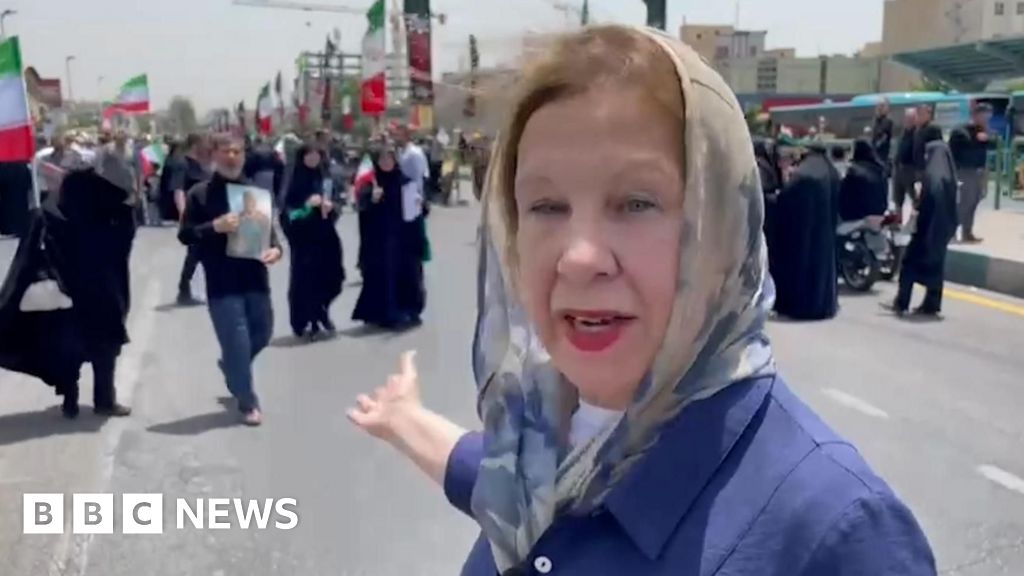The BBC's Chief International Correspondent Lyse Doucet reports from Tehran, where a mass state funeral took place on Saturday. Crowds gathered to mourn the deaths of about 60 people, including military commanders and nuclear scientists, killed during the 12-day conflict with Israel. The conflict ended with a ceasefire earlier this week, after the US became directly involved by bombing key nuclear sites in Iran. Lyse Doucet is being allowed to report from Iran on the condition that none of her reports are used by the BBC's Persian service. This law from Iranian authorities applies to all international media agencies operating in Iran. Read more on this story The BBC's Lucy Williamson is outside Soroka Hospital in Beersheba, in the south of the country, as emergency workers assess the scene. Israel's Prime Minister has long warned that Iran is close to developing nuclear weapons. BBC Verify's Ros Atkins explains what we know about its programme. Iran's Fordo nuclear site is one of the most heavily fortified. There's only one conventional weapon that could destroy it - and only the US is known to have it. Videos posted on social media show queues for fuel and gridlocked traffic as people try to leave Tehran. The BBC's Middle East correspondent Hugo Bachega is in Petah Tikva, where an Iranian missile struck a building overnight. Five people have been killed and dozens injured, according to Israel's national emergency service. Footage from Reuters news agency and The Associated Press shows burning cars after a missile strike in the Israeli city of Haifa. BBC correspondent Hugo Bachega reports from Bat Yam near Tel Aviv which has been targeted by Iran. Israel and Iran have continued to attack each other throughout the night Emergency services in the Israel's of Bat Yam launch rescue efforts following Iran strike. Israeli authorities have indicated that this could be the beginning of a prolonged campaign against Iran. The BBC's Hugo Bachega reports from Jerusalem as the two sides trade fire. Iran launched a fresh wave of missiles towards the country on Friday night, vowing to "inflict heavy blows". Israel's wave of strikes against Iran, which began on Thursday night, has continued through today. BBC Verify's Merlyn Thomas has been examining footage of the attacks and the damage they've caused. Israel's prime minister said Iran's nuclear capability posed a "clear and present danger", while Iran's president promised a "powerful" response. The BBC's Hugo Bachega reports from Jerusalem, after Israel launched overnight strikes against sites across Iran. Israeli Prime Minister Benjamin Netanyahu said in a video statement that Israel has launched Operation Rising Lion. Israel says it has carried out strikes on Iran's nuclear programme, with blasts and fires seen in Tehran and elsewhere. Palestinians can be seen climbing over fences and running to get humanitarian aid in the footage. The BBC heard from dozens of former officials about their role enforcing the brutality of the Assad regime.
Watch: Anger and uncertainty in Iran as crowds mourn dead
TruthLens AI Suggested Headline:
"Mass Funeral in Tehran Amid Escalating Iran-Israel Conflict"
TruthLens AI Summary
In Tehran, a mass state funeral was held for approximately 60 individuals, including military commanders and nuclear scientists, who lost their lives during a recent 12-day conflict with Israel. This conflict came to a halt with a ceasefire earlier this week, following direct U.S. military involvement marked by bombings of critical nuclear sites in Iran. The situation has led to heightened tension and uncertainty within the country, as crowds gathered to mourn their deceased while expressing their anger towards the circumstances surrounding their deaths. The Iranian government has imposed restrictions on international media, allowing reports from the BBC only under the condition that none are disseminated through its Persian service. This reflects the tight control the Iranian authorities maintain over information within the country, particularly regarding sensitive topics such as military actions and foreign relations.
Meanwhile, the conflict has escalated further with Iran and Israel exchanging missile strikes, intensifying the cycle of violence. Reports indicate that an Iranian missile struck a building in Petah Tikva, resulting in casualties and injuries, while Israeli forces have been launching retaliatory strikes against Iranian targets. The Israeli Prime Minister has warned that the Iranian nuclear program poses a significant threat, while Iran has vowed to respond forcefully to the ongoing strikes. As both nations engage in military actions, the humanitarian situation continues to deteriorate, with civilians caught in the crossfire. Footage from various locations shows the aftermath of attacks, including burning vehicles and emergency rescue efforts, underscoring the urgent need for humanitarian aid amidst the chaos. The potential for a prolonged conflict looms, with both sides preparing for further confrontations in the days to come.
TruthLens AI Analysis
You need to be a member to generate the AI analysis for this article.
Log In to Generate AnalysisNot a member yet? Register for free.
